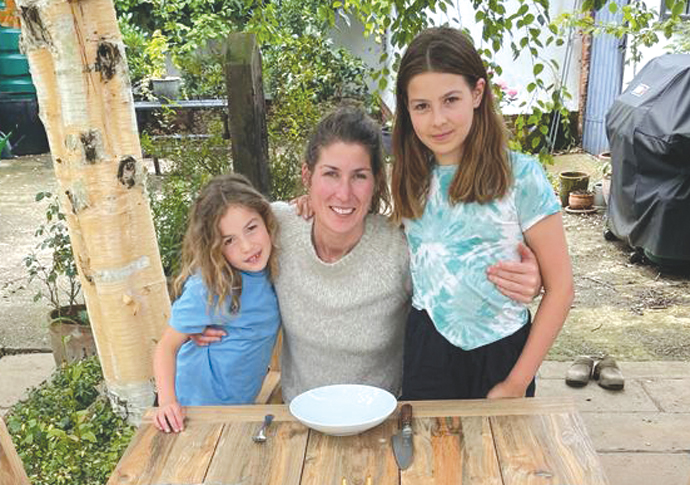Air quality campaigner: Escape to the country was great for us
ECO 2024: Environmentalist and her husband had wanted to leave London 'ever since we got together'
Friday, 5th January 2024 — By Charlotte Chambers

Helena Farstad with daughters Ebba and Hennie
ONCE a loud voice in the campaign to improve air quality in the borough, who repeatedly challenged the council to hold a citizen’s assembly, Helena Farstad gave it all up for a life in the countryside with her family last year.
The Norwegian-raised environmentalist said both she and her husband Cameron McKeown, who owns the popular Oak N4 wine bar in Finsbury Park, had wanted to leave London “ever since we got together” but finally made the jump in order to give their daughters more time outside.
“Because of the environment we now live in, we don’t have any moving vehicles around us so the girls can basically just run and go. So they just disappeared, and we can cycle a lot as well,” she said of their new home in a small town on the outskirts of Diss in Norfolk.
On their arrival to their picture postcard home in April, all the flowers were in bloom and there was bird song all around.
“It was absolutely wonderful,” she said, but one thing in particular struck her: the silence.
“I think personally, I really was more affected by the noise in London than I realised,” she said.
“The noise is a massive thing, which has really made my life much better in many, many ways.”
She described how in her previous life in Mayton Street, Holloway, she found it harder to go out.
“We leave the house more and go out for bike rides, we go to the library,” she said of their new life.
“In London, I didn’t do that as much because it felt like a barrier. You didn’t know what was going to hit you when you went down the street – the noise and the chaos.”
But being an inveterate campaigner, Ms Farstad doesn’t just see the surface idyll surrounding her – something darker exists among the country lanes and hedgerows too.
Where once there were sheep, pigs and chickens, now many farms are renting out their buildings and land to commercial businesses as a way of “branching out” to survive.
FREE, SIMPLE-TO CANCEL 30-DAY TRIAL OF AUDIBLE
Another issue is monoculture: the land is dominated by the farming of sugar beets and animal feed as well as anaerobic digestion plants – vast sealed tanks that produce renewable energy through the creation of methane.
Taking on perhaps her biggest challenge yet, Ms Farstad describes what she sees around her as a “huge mismanagement of lands” and argues the ownership of land needs to be addressed.
Rather than having a few landlords with thousands of acres each, it should be divided into a few hundred acres but for a greater number of people, with a diverse range of food production and smaller fields with more hedges for wildlife. She also warned that the soil “has been absolutely ruined” by large agriculture, causing flooding as the water doesn’t saturate the ground.
Would she recommend moving to the sticks for others?
“I’d say think really hard about it because it is a such a different life,” she warned. “If you’re happy with a slower, calmer existence, then this might be something for you.
“If you’re driven by the energy from the city then maybe pause a little bit. But for us, it was a great move.”

